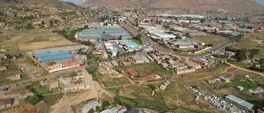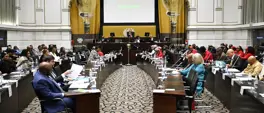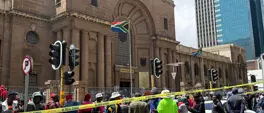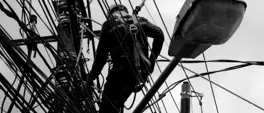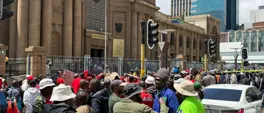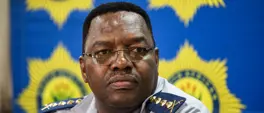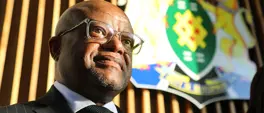POLITRICKING | 'There is no police commissioner on the frontline' – Riah Phiyega talks fire pool, Marikana and crime fighting in communities
Tshidi Madia
21 August 2024 | 8:41Former police commissioner Riah Phiyega is the first guest of a new season of 'Politricking with Tshidi Madia'. In an exclusive interview, she speaks ‘her truth’ on the Marikana massacre, Zuma, and SA being ‘a lazy doer’.
Twelve years since the Marikana tragedy that saw the state unleash its might on striking mineworkers at Lonmin mine in the North West, then-police commissioner Riah Phiyega maintains she was nothing more than a scapegoat for the incident.
What’s become known as the Marikana massacre was a symbol of the abuse of power, which saw Phiyega being declared not fit to hold office by a commission of inquiry led by retired Judge Ian Farlam.
The inquiry found she had misled the commission by concealing some information about developments at the koppie outside of the Nkaneng settlement.
"Everyone has a right to their opinion, but the one thing I can tell you is that I own my truth about that matter. There is no police commissioner. I will say it over and over again, that you will find in the front line," says Phiyega.
She is the first guest of a new season of Politricking with Tshidi Madia, in which Phiyega refuses to deliberate in-depth on the 12-year anniversary of the Marikana massacre, instead, leaning on a common argument used by controversial prominent leaders that one day, a "tell-all book" will be penned.
The former police commissioner is one of just two to have finished her term of office, albeit on suspension with full pay.
George Fivas, who was appointed by President Nelson Mandela, is the only other police commissioner to have completed five years in office.
In 2024, Phiyega continues to work serving communities, still focusing on crime fighting, through a relationship she has with the Police and Prisons Civil Rights Union (POPCRU), which founded the Safer South Africa Foundation (SSAF).
Phiyega is the SSAF’s current CEO, a non-profit organisation which focuses its attention on serving under-resourced communities.
While insisting she will pen a book telling her side of the story of what happened in Marikana, which took place 64 days after she took over as police commissioner, Phiyega defended her role in the Nkandla probe.
She and former police minister, Nathi Nhleko, were seen to have defended the non-security upgrades at former President Jacob Zuma’s home.
The African National Congress (ANC), Zuma’s former political party, has done an about-turn on the matter, acknowledging that it abused its role in Parliament and the executive to defend the indefensible.
"Fire pool never came from my mouth," she said.
Phiyega said that labelling a swimming pool built at Zuma's home as a fire pool was a phrase introduced into the plans by engineers.
"We were at the Department of Communications, there was a discussion, and I raised my hand. All I said was where I grew up, we didn't have fire hydrants, and one of the things we needed is water. And isn't it true, what do we do where there are no fire hydrants? Do we not use buckets? Do we not need water? That’s what I said," she said.
"In my village, in Leshoane, behind the Turfloop mountain view, we do not have fire hydrants, and if there’s a fire, we will use buckets," she adds.
Phiyega also understands perceptions that she’s been arrogant in the handling of such matters, arguing that a woman who’s able to stand up for herself automatically invites criticism and attacks.
The former police commissioner remains hopeful about the country’s future, insisting that South Africa must learn to go beyond legislation and documents, labelling the country a "lazy doer".
"We have the most beautiful legislation in this country, in various areas. The reports that we are talking about, we talk about the Zondo Commission, beautiful - if we're just that, doing, we will see a different country," says Phiyega.
And without directly mentioning the Government of National Unity, she praised the diversity in governances necessitated by the 2024 general election results, which saw no party garner a clear majority from the electorate.
Get the whole picture 💡
Take a look at the topic timeline for all related articles.
